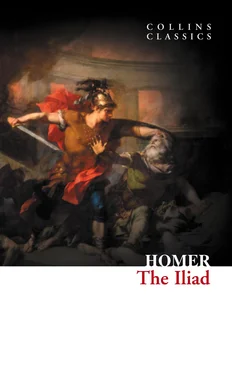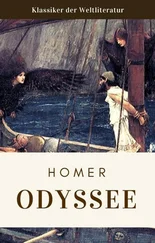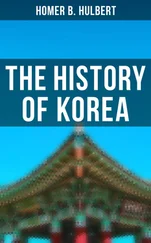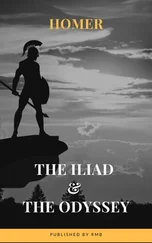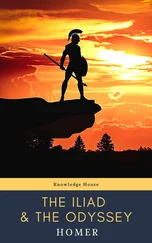And the bold sons of great Evenus slew.
There mourn’d Achilles, plunged in depth of care,
But soon to rise in slaughter, blood, and war.
To these the youth of Phylace succeed,
Itona, famous for her fleecy breed,
And grassy Pteleon deck’d with cheerful greens,
The bowers of Ceres, and the sylvan scenes.
Sweet Pyrrhasus, with blooming flowerets crown’d,
And Antron’s watery dens, and cavern’d ground.
These own’d, as chief, Protesilas the brave,
Who now lay silent in the gloomy grave:
The first who boldly touch’d the Trojan shore,
And dyed a Phrygian lance with Grecian gore;
There lies, far distant from his native plain;
Unfinish’d his proud palaces remain,
And his sad consort beats her breast in vain.
His troops in forty ships Podarces led,
Iphiclus’ son, and brother to the dead;
Nor he unworthy to command the host;
Yet still they mourn’d their ancient leader lost.
The men who Glaphyra’s fair soil partake,
Where hills incircle Boebe’s lowly lake,
Where Phaere hears the neighbouring waters fall,
Or proud Iolcus lifts her airy wall,
In ten black ships embark’d for Ilion’s shore,
With bold Eumelus, whom Alceste bore:
All Pelias’ race Alceste far outshined,
The grace and glory of the beauteous kind,
The troops Methone or Thaumacia yields,
Olizon’s rocks, or Meliboea’s fields,
With Philoctetes sail’d whose matchless art
From the tough bow directs the feather’d dart.
Seven were his ships; each vessel fifty row,
Skill’d in his science of the dart and bow.
But he lay raging on the Lemnian ground,
A poisonous hydra gave the burning wound;
There groan’d the chief in agonizing pain,
Whom Greece at length shall wish, nor wish in vain.
His forces Medon led from Lemnos’ shore,
Oileus’ son, whom beauteous Rhena bore.
The Œchalian race, in those high towers contain’d
Where once Eurytus in proud triumph reign’d,
Or where her humbler turrets Tricca rears,
Or where Ithome, rough with rocks, appears,
In thirty sail the sparkling waves divide,
Which Podalirius and Machaon guide.
To these his skill their parent-god imparts,
Divine professors of the healing arts.
The bold Ormenian and Asterian bands
In forty barks Eurypylus commands.
Where Titan hides his hoary head in snow,
And where Hyperia’s silver fountains flow.
Thy troops, Argissa, Polypoetes leads,
And Eleon, shelter’d by Olympus’ shades,
Gyrtone’s warriors; and where Orthe lies,
And Oloosson’s chalky cliffs arise.
Sprung from Pirithous of immortal race,
The fruit of fair Hippodame’s embrace,
(That day, when hurl’d from Pelion’s cloudy head,
To distant dens the shaggy Centaurs fled)
With Polypoetes join’d in equal sway
Leonteus leads, and forty ships obey.
In twenty sail the bold Perrhaebians came
From Cyphus, Guneus was their leader’s name.
With these the Enians join’d, and those who freeze
Where cold Dodona lifts her holy trees;
Or where the pleasing Titaresius glides,
And into Peneus rolls his easy tides;
Yet o’er the silvery surface pure they flow,
The sacred stream unmix’d with streams below,
Sacred and awful! from the dark abodes
Styx pours them forth, the dreadful oath of gods!
Last, under Prothous the Magnesians stood,
(Prothous the swift, of old Tenthredon’s blood;)
Who dwell where Pelion, crown’d with piny boughs,
Obscures the glade, and nods his shaggy brows;
Or where through flowery Tempe Peneus stray’d:
(The region stretch’d beneath his mighty shade:)
In forty sable barks they stemm’d the main;
Such were the chiefs, and such the Grecian train.
Say next, O Muse! of all Achaia breeds,
Who bravest fought, or rein’d the noblest steeds?
Eumelus’ mares were foremost in the chase,
As eagles fleet, and of Pheretian race;
Bred where Pieria’s fruitful fountains flow,
And train’d by him who bears the silver bow.
Fierce in the fight their nostrils breathed a flame,
Their height, their colour, and their age the same;
O’er fields of death they whirl the rapid car,
And break the ranks, and thunder through the war.
Ajax in arms the first renown acquired,
While stern Achilles in his wrath retired:
(His was the strength that mortal might exceeds,
And his the unrivall’d race of heavenly steeds:)
But Thetis’ son now shines in arms no more;
His troops, neglected on the sandy shore.
In empty air their sportive javelins throw,
Or whirl the disk, or bend an idle bow:
Unstain’d with blood his cover’d chariots stand;
The immortal coursers graze along the strand;
But the brave chiefs the inglorious life deplored,
And, wandering o’er the camp, required their lord.
Now, like a deluge, covering all around,
The shining armies sweep along the ground;
Swift as a flood of fire, when storms arise,
Floats the wild field, and blazes to the skies.
Earth groan’d beneath them; as when angry Jove
Hurls down the forky lightning from above,
On Arime when he the thunder throws,
And fires Typhoeus with redoubled blows,
Where Typhon, press’d beneath the burning load,
Still feels the fury of the avenging god.
But various Iris, Jove’s commands to bear,
Speeds on the wings of winds through liquid air;
In Priam’s porch the Trojan chiefs she found,
The old consulting, and the youths around.
Polites’ shape, the monarch’s son, she chose,
Who from Æsetes’ tomb observed the foes,
High on the mound; from whence in prospect lay
The fields, the tents, the navy, and the bay.
In this dissembled form, she hastes to bring
The unwelcome message to the Phrygian king.
“Cease to consult, the time for action calls;
War, horrid war, approaches to your walls!
Assembled armies oft have I beheld;
But ne’er till now such numbers charged a field:
Thick as autumnal leaves or driving sand,
The moving squadrons blacken all the strand.
Thou, godlike Hector! all thy force employ,
Assemble all the united bands of Troy;
In just array let every leader call
The foreign troops: this day demands them all!”
The voice divine the mighty chief alarms;
The council breaks, the warriors rush to arms.
The gates unfolding pour forth all their train,
Nations on nations fill the dusky plain,
Men, steeds, and chariots, shake the trembling ground:
The tumult thickens, and the skies resound.
Amidst the plain, in sight of Ilion, stands
A rising mount, the work of human hands;
(This for Myrinne’s tomb the immortals know,
Though call’d Bateia in the world below;)
Beneath their chiefs in martial order here,
The auxiliar troops and Trojan hosts appear.
The godlike Hector, high above the rest,
Shakes his huge spear, and nods his plumy crest:
In throngs around his native bands repair,
And groves of lances glitter in the air.
Divine Æneas brings the Dardan race,
Anchises’ son, by Venus’ stolen embrace,
Born in the shades of Ida’s secret grove;
(A mortal mixing with the queen of love;)
Archilochus and Acamas divide
The warrior’s toils, and combat by his side.
Who fair Zeleia’s wealthy valleys till,
Fast by the foot of Ida’s sacred hill,
Or drink, Æsepus, of thy sable flood,
Were led by Pandarus, of royal blood;
To whom his art Apollo deign’d to show,
Читать дальше
